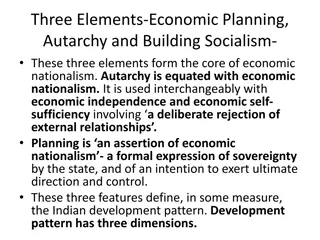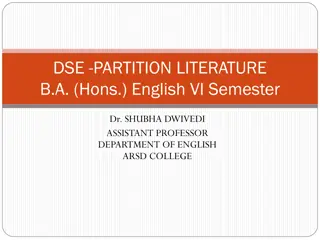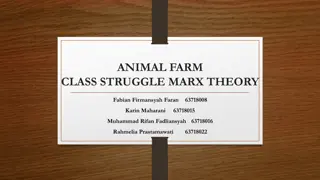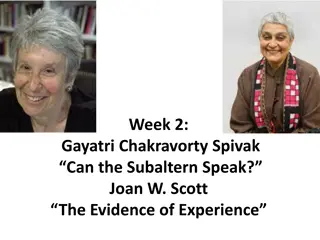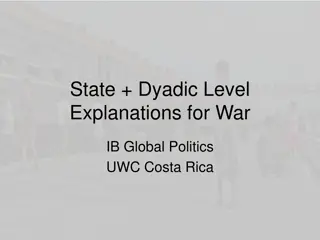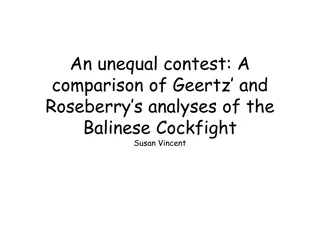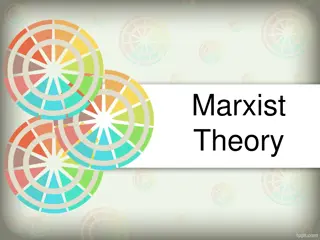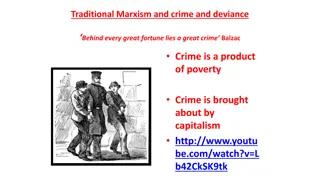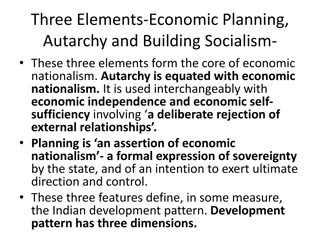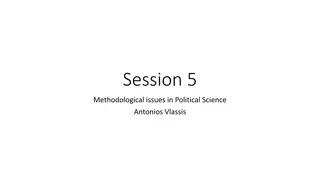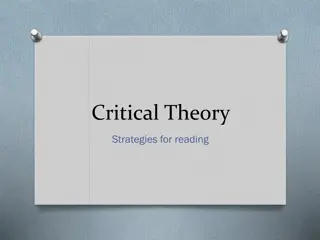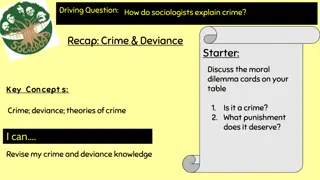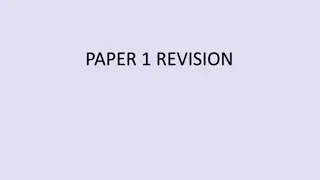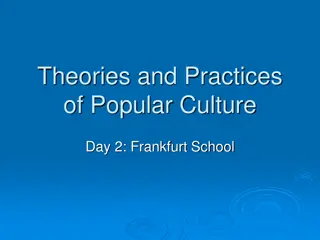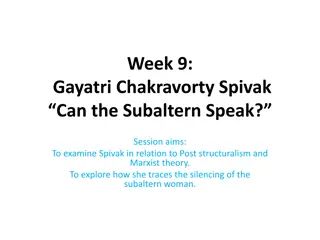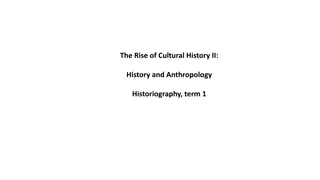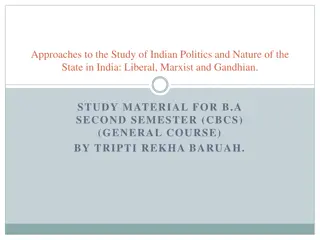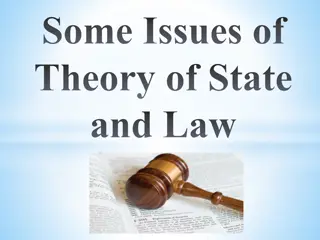Ginzburg Landau phenomenological Theory
The Ginzburg-Landau phenomenological theory explains superconductivity and superfluidity as distinct thermodynamic phases. It focuses on phase transitions characterized by singularities in specific heat at the transition temperature. Derived from BCS theory, it quantifies condensation energy, emphas
1 views • 38 slides
Approaches to the study of Human Rights
The Marxist perspective on human rights emphasizes social rights over individual rights, viewing the full realization of self within society. Marx connects bourgeois society with human rights, highlighting how exploitation under capitalism alienates individuals. In contrast, the Third World perspect
5 views • 19 slides
A.R. Desai: Contributions to Indian Nationalism and Sociology
A.R. Desai, a prominent figure in the field of sociology, made significant contributions to Indian nationalism and the study of society in India. His works focused on topics such as the social background of Indian nationalism, peasant movements, path of development, and Marxist democratic rights. De
5 views • 14 slides
Evolution of Mathematical Theories and Proof Systems
Development of mathematical theories such as model theory, proof theory, set theory, recursion theory, and computational complexity is discussed, starting from historical perspectives with Dedekind and Peano to Godel's theorems, recursion theory's golden age in the 1930s, and advancements in proof t
1 views • 29 slides
The Development Pattern and Rationale Behind Economic Nationalism in India
Three core elements - economic planning, autarchy, and building socialism - define India's development pattern focused on self-sufficiency and state ownership of industries. The rationale behind this approach is debated between economic theory influences and Marxist perspectives, reflecting a commit
6 views • 14 slides
Psychological Theories of Criminality: Understanding the Roots
Psychological theories of criminality delve into the association between intelligence, personality, learning, and criminal behavior. Major theories include Psychodynamic Theory by Freud, Behavioral Theory by Bandura, and Cognitive Theory by Kohlberg. These theories explore how unconscious mental pro
1 views • 20 slides
Insights into Manik Bandopadhyay’s Works and Ideologies
Manik Bandopadhyay, an eminent Indian writer, delved into the complexities of human psyche and societal issues in his novels and short stories. Influenced by Marxist philosophy and Freudian principles, he portrayed ordinary individuals enduring extraordinary circumstances during the colonial era. Hi
4 views • 11 slides
Understanding Class Struggle in Animal Farm through Marxist Ideology
Animal Farm, written by George Orwell, explores the concept of class struggle through the lens of Marxist ideology. The novel depicts the conflict between the bourgeoisie, represented by characters like Mr. Jones, and the proletariat, symbolized by the other animals on the farm. Through the story of
0 views • 12 slides
Understanding the Theory of Firms: Neoclassical vs. Modern Approaches
The theory of firms is explored through the Neoclassical and Modern perspectives. Neoclassical theory focuses on profit maximization, while Modern theory delves into managerial, principal-agent, and transaction cost theories. The discussion covers criticisms of Neoclassical theory and the essential
1 views • 79 slides
Understanding Literary Criticism: A Comprehensive Overview
Literary criticism involves the study, evaluation, and interpretation of literature, focusing on themes, styles, settings, and historical contexts. This discipline explores the meanings, workings, and values of literary works through interpretation, analysis, and evaluation. Various types of literar
2 views • 20 slides
Critical Perspectives on Postcolonialism and Structuralism in Spivak's Work
Gayatri Chakravorty Spivak is known for her critical engagement with postcolonial theory and deconstruction, challenging traditional Western perspectives. By drawing on thinkers like Derrida and Foucault, Spivak offers a unique lens to interrogate power dynamics, hegemony, and resistance. Her work r
0 views • 31 slides
Theories of Causation in Psychological and Social Sciences
Overview of theories of causation categorized into psychological, social psychological, and sociological perspectives. Psychological theories focus on instinctive, biological, and psychological qualities of abusers, including Attachment Theory, Psychodynamic Theory, Social Learning Theory, and Situa
0 views • 15 slides
Examining State-Level and Dyadic Explanations for War in Global Politics
Understanding the reasons why certain states are more war-prone than others involves exploring factors such as economy, internal opposition, and political systems. Marxist explanations argue that capitalist economies are more prone to war due to issues like overproduction, wealth inequality, and imp
0 views • 17 slides
Understanding Political Theory through a Contextual Approach
Exploring G.H. Sabine's perspective on political theory through a contextual approach, emphasizing the importance of historical context and societal influences. Sabine argues that while political theory evolves with its contemporary politics, it should be analyzed within its specific time and social
0 views • 9 slides
Evolution of Light Theory: From Wave Theory to Quantum Theory
At the turn of the century, the discovery of the photoelectric effect challenged the wave theory of light, leading to the development of the quantum theory by Max Planck and Albert Einstein. This new theory introduced the concept of discrete energy units known as quanta, bridging the gap between wav
1 views • 62 slides
Perspectives on Youth Culture Through Functionalist and Neo-Marxist Views
Functionalist and Neo-Marxist perspectives on youth culture offer contrasting views on its purpose in society. Functionalist theorists emphasize the role of youth culture in providing a transitional phase for young people, aiding in their social integration and development of independence. On the ot
0 views • 11 slides
Dp-branes, NS5-branes, U-duality, and M-Theory Overview
Overview of Dp-branes, NS5-branes, and U-duality derived from nonabelian (2,0) theory with Lie 3-algebra. Introduction to M-theory, including M2-branes and M5-branes in the strong coupling limit. Discussion on BLG theory, Lorentzian Lie 3-algebra, and the ABJM theory for M2-branes.
1 views • 32 slides
Exploring Critical Theory Through Literary Criticism and Analogy
Delve into the realm of critical theory through literary criticism, using the analogy of different perspectives on seeing an orange to understand the various facets of analysis like reader response, Marxist/social power, feminist/gender, and psychoanalytic criticism. Discover how critical theory hel
0 views • 9 slides
Understanding Time-Independent Perturbation Theory in Quantum Mechanics
Perturbation theory is a powerful tool in solving complex physical and mathematical problems approximately by adjusting solutions from a related problem with known solutions. This theory allows for more accurate approximate solutions by treating the difference as a small perturbation. An example inv
0 views • 19 slides
Labor Super-Exploitation and Value Transfer in Global Economy
Original research explores how labor super-exploitation and transformation drive international value transfer in the capitalist system. The study bridges orthodox Marxist and Ricardian perspectives, offering new insights into unequal exchange and imperialism.
1 views • 21 slides
Ethical Theories: Divine Command vs. Virtue Theory Explained
Divine Command Theory asserts that morality is derived from God's commands, contrasting with Virtue Theory which focuses on developing moral virtues to achieve human flourishing and excellence. Divine Command Theory relies on religious texts, while Virtue Theory emphasizes the cultivation of virtues
0 views • 24 slides
Understanding Fermi Liquid Theory in Interacting Fermion Systems
Fermi liquid theory, also known as Landau-Fermi liquid theory, is a theoretical model that describes the normal state of metals at low temperatures. Introduced by Landau and further developed by Abrikosov and Khalatnikov, this theory explains the similarities and differences between interacting ferm
0 views • 23 slides
An Unequal Contest: Geertz vs. Roseberry on the Balinese Cockfight
This analysis compares Geertz's famous essay on the Balinese cockfight with Roseberry's critique, arguing that Roseberry's focus on economic factors, inequality, conflict, and dynamic social processes provides a more comprehensive analysis compared to Geertz's entertaining yet partial interpretation
0 views • 20 slides
Computational Learning Theory: An Overview
Computational Learning Theory explores inductive learning algorithms that generate hypotheses from training sets, emphasizing the uncertainty of generalization. The theory introduces probabilities to measure correctness and certainty, addressing challenges in learning hidden concepts. Through exampl
0 views • 43 slides
Automata Theory and Theory of Computation Overview
This course overview covers concepts in automata theory and theory of computation, including formal language classes, grammars, recognizers, theorems in automata theory, decidability, and intractability of computational problems. The Chomsky hierarchy, interplay between computing components, modern-
0 views • 42 slides
Understanding Marxist Theory: Key Concepts and Implications
The Marxist theory, rooted in Karl Marx's philosophy, emphasizes the control of means of production as a determinant of societal power dynamics. This ideology examines economic power, materialism versus spirituality, class conflict, and the role of art, literature, and ideologies in shaping culture
0 views • 17 slides
Marxist Perspectives on Crime and Law Enforcement
Traditional Marxism views crime as a product of poverty and capitalism, emphasizing the manipulation of values by the powerful to maintain control. Marxism challenges the idea that law reflects the will of the people, arguing that it serves the interests of the ruling class by passing and enforcing
0 views • 19 slides
Economic Nationalism and Development Pattern in India
Economic nationalism in India was characterized by the elements of economic planning, autarchy, and socialism. The development pattern focused on capital goods industries, inward orientation, and state ownership. Two interpretations of this pattern were influenced by economic theory and Marxist pers
0 views • 13 slides
Theories of Interest in Microeconomics II
Explore various theories of interest in economics, including the Classical Theory, Liquidity Preference Theory by Keynes, Productivity Theory, Abstinence Theory, Time-Preference Theory, Fisher's Time Preference Theory, and the Loanable Fund Theory. These theories offer different perspectives on the
0 views • 6 slides
Exploring the Evolution of Atomic Theory
Delve into the historical journey of atomic theory starting from Democritus and Aristotle's views to modern advancements proving some aspects of Dalton's theory incorrect. Learn about key laws and theories such as the Particle Theory of Matter, Dalton's Atomic Theory, and JJ Thomson's discoveries, s
0 views • 30 slides
Understanding Classical Marxism: Key Concepts and Critiques
Marxism, rooted in the ideas of Karl Marx, emphasizes the significance of economic relations in shaping social and political structures. Classical Marxism focuses on economism, determinism, materialism, and structuralism, viewing history through a lens of class struggle and offering an emancipatory
0 views • 21 slides
Exploring Critical Theory Strategies in Literary Analysis
Delve into the diverse approaches of Critical Theory to interpret and analyze literary works with new lenses. From Formalist and Biographical Criticism to Historical and Marxist perspectives, uncover hidden layers and meanings in texts through multiple viewpoints. Explore the role of psychoanalytic
0 views • 24 slides
Explaining Crime: Sociological Perspectives and Methods
Sociologists explain crime through various theories such as Marxist, New Right, and subcultural explanations, as well as through the lens of labeling theory. They explore factors like social order, control, formal and informal rules, and the impact of societal structures on criminal behavior. Method
0 views • 10 slides
Comprehensive Education Revision Overview for Exam Preparation
Delve into a detailed overview of education topics including exam structures, theories, relationships, gender, ethnicity, and social policy. Explore sample questions for both 10-mark and 30-mark scenarios, with guidance on applying material and evaluating perspectives. Additionally, familiarize your
0 views • 24 slides
The Frankfurt School and Cultural Critique
The Frankfurt School, a group of critical theorists, challenged traditional Marxist views on culture and ideology. They examined how mass media and consumer culture influenced society, highlighting the role of ideas in reflecting economic positions. Despite capitalism's stability, they explored the
0 views • 25 slides
Reimagining Theoretical Boundaries: Spivak's Critical Perspectives
Gayatri Chakravorty Spivak challenges traditional categories by constantly revising her critical theories in response to societal changes. She explores the silencing of subaltern women, drawing on post-structuralist and Marxist ideas to question Western imperialism. Spivak's work reflects a dynamic
0 views • 26 slides
The Rise of Cultural History II: History and Anthropology Historiography
This content explores the concepts of cultural history, Marxist thought, cultural hegemony, and the works of Antonio Gramsci. It delves into the history of anthropology, discussing key figures such as Franz Boas and Malinowski, and highlights the intersection of anthropology and history in understan
0 views • 9 slides
Macromechanical Analysis of Lamina and Tsai-Hill Failure Theory Overview
The Tsai-Hill failure theory is based on the strengths of a unidirectional lamina, incorporating longitudinal and transverse tensile and compressive strengths, as well as in-plane shear strength. This theory, derived from the distortion energy theory, provides criteria for determining lamina failure
0 views • 15 slides
Approaches to Study of Indian Politics: Liberal, Marxist, and Gandhian Perspectives
Political Science encompasses various approaches such as Liberal, Marxist, and Gandhian for studying Indian politics. Scholars have explored the nature of the Indian state post-independence, focusing on democratization, social heterogeneity, and class dynamics. The Marxist approach views the state a
0 views • 14 slides
Understanding the State and Law: Key Concepts and Perspectives
The discussion delves into the essence of the state and law, exploring various theoretical approaches such as social, Marxist, and political-legal perspectives. It defines the state as the main institution of the political system integrating social classes, powers, and politics, with persistent feat
1 views • 30 slides




